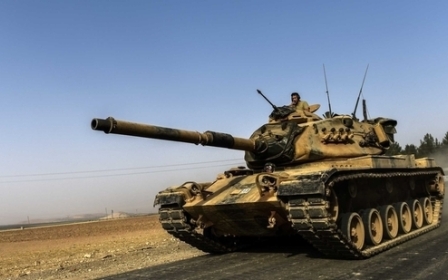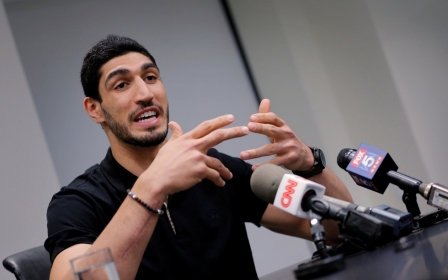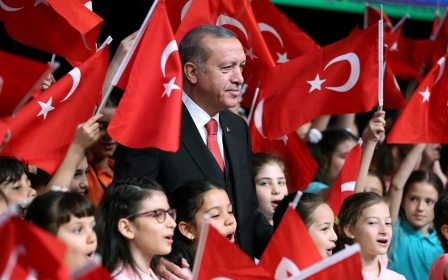German cabinet backs troop pullout from Turkey base after row
Germany's cabinet on Wednesday backed the withdrawal of troops from the Incirlik air base in southern Turkey, the German defence minister said, following Ankara's refusal to allow German lawmakers access to its soldiers there.
Germany plans to move the 280 German soldiers to an air base in Jordan but has stressed it wants to minimise any disruption to the US-led coalition operation against Islamic State in Iraq and Syria, of which it is part.
Turkey has refused to allow German lawmakers to make a routine visit to the base, saying that Berlin needs to improve its attitude towards Turkey first.
However, Chancellor Angela Merkel said on Wednesday that it was important that Germany and Turkey keep talking even after German troops leave the air base.
"We have a huge range of common interests with Turkey and also close economic relations, so discussions are very necessary," Merkel told reporters.
Turkey was infuriated when Germany, citing security concerns, banned some Turkish politicians from campaigning on its soil. Ankara responded by accusing Berlin of "Nazi-like" tactics and has since reignited a row over Incirlik.
"Given that Turkey is currently not in a position to allow German parliamentarians the right to visit Incirlik, the cabinet today agreed to move the Bundeswehr from Incirlik to Jordan," Defence Minister Ursula von der Leyen told reporters.
Lawmakers are still discussing whether the proposed withdrawal should be put to a parliamentary vote. German armed forces are subordinated to parliament, not the government, meaning lawmakers have oversight of the troops.
Von der Leyen said she would hold immediate talks with the US military and the US-led coalition fighting IS to minimise the impact of the move and would set the timetable accordingly. She will brief cabinet and parliament next week.
She has said withdrawing German refuelling aircraft would take two to three weeks, and the relocation of reconnaissance jets two to three months.
Foreign Minister Sigmar Gabriel was in Turkey on Monday in a last attempt to convince Ankara to avert a pullout, but said Turkey had once again refused the visits for "domestic political reasons."
He said he had wanted to avoid further hurting ties with Turkey and pushing it towards Russia.
Critics have accused Chancellor Angela Merkel, who faces an election in September, of cosying up to Erdogan to secure his help in stemming the flow of migrants to western Europe.
Extradition demand
Aside from the Incirlik dispute, Germany has expressed concern about the security crackdown in Turkey after last year's failed coup. Some 150,000 people have been sacked or suspended from their jobs and 50,000 people jailed pending trial.
Turkish officials say the steps are necessary because of the gravity of the coup attempt, which killed 240 people.
But critics in Turkey and abroad say Erdogan is using the failed coup as a pretext to muzzle dissent and purge opponents.
German officials said last month that 414 Turkish citizens with diplomatic passports and other government work permits had requested asylum since the attempted putsch. Berlin's interior ministry has confirmed that asylum requests had been approved for a number of them, a move that angered Ankara.
"Those who seek asylum to escape Turkey and have been mixed up in the coup should be extradited," Foreign Minister Mevlet Cavusoglu told a news conference on Monday.
He said relations between the two countries, as well as regional cooperation, had suffered recently. "If Germany takes one step towards us, we can take two towards them, but we cannot overlook the current situation," he said.
Commenting on the case of German-Turkish journalist Deniz Yucel, whom Turkey arrested in February on a charge of spreading terrorist propaganda, Cavusoglu said there was a trend in Europe for intelligence agencies to use journalists as agents.
"The accusations about Yucel are not related to journalism, but rather to terror. This is a sensitive issue for all of us," he said, adding that Yucel's case was a matter for the courts. "Our independent judiciary is carrying out the process. The judiciary will make the decision on Yucel," Cavusoglu said.
New MEE newsletter: Jerusalem Dispatch
Sign up to get the latest insights and analysis on Israel-Palestine, alongside Turkey Unpacked and other MEE newsletters
Middle East Eye delivers independent and unrivalled coverage and analysis of the Middle East, North Africa and beyond. To learn more about republishing this content and the associated fees, please fill out this form. More about MEE can be found here.




